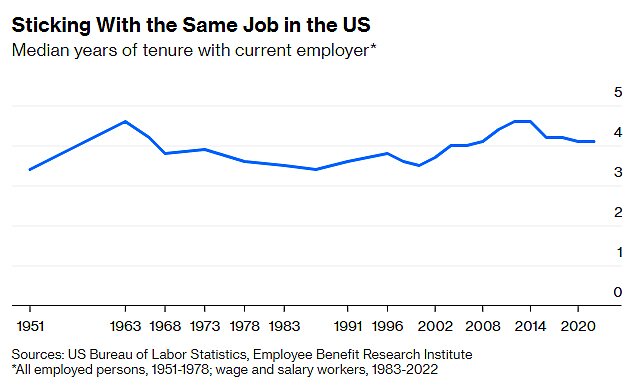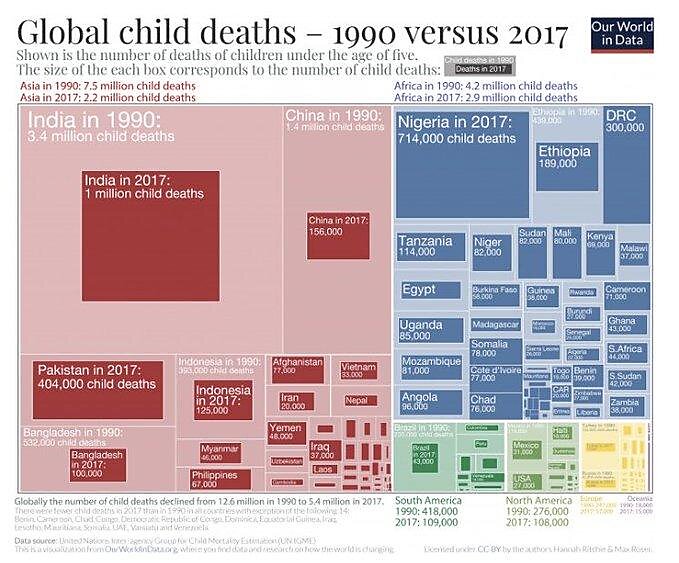Dear Capitolisters (and those wanting to charge me with treason),
I planned to wait for the official rollout of my forthcoming book, Empowering the New American Worker, before getting into its many weeds, but recent events (and my impatience) pushed me to reconsider. In particular, we learned last week that Florida officials had arrested a Texas-licensed roofer for repairing a home damaged by Hurricane Ian and that several states weren’t extending their pandemic-related rules relaxing telehealth restrictions. At first blush, these events and the parties involved would seem to have little in common. Dig a little deeper, however, and we find that both depend on a policy—occupational licensing—that’s grown in prominence in recent years, with significant harms for workers, consumers, and the U.S. economy more broadly. And since licensing earned its own Empowering chapter by my Cato colleague Chris Edwards, it’s a perfect time to discuss it (again).
A Review of Occupational Licensing’s Growth and Burdens
Indeed, we first discussed occupational licensing here two years ago in the context of the pandemic-driven rise in American entrepreneurship. As Edwards and many other scholars have explained, however, licensing’s implications go much further than mere business-formation. That’s because licensing regulations—state-based restrictions on individuals entering an occupation unless they fulfill specific educational, training, and testing requirements—have exploded over the years, affecting about 5 percent of U.S. jobs in the 1950s but about 22 percent today. Regulated occupations also vary widely by state: The White House estimated in 2015 that about 1,100 different occupations required a license that year, up from only 30 in 1920. States now license not only medical and legal professionals, but also—per Edwards—“cosmetologists, manicurists, barbers, preschool teachers, athletic trainers, makeup artists, security alarm installers, taxidermists, sports coaches, travel agents, bartenders, animal trainers, tree trimmers, tour guides, interior designers, auctioneers, massage therapists, and many others.” Whew.
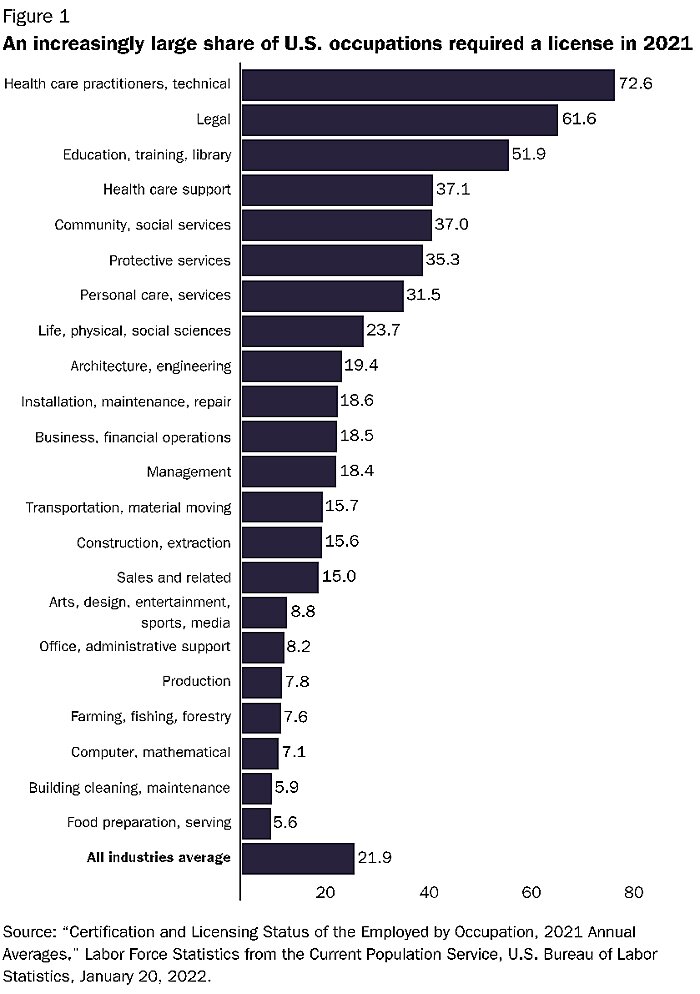
By restricting the supply of available services within and across state borders, licensing imposes all sorts of economic costs—and there’s now a deep reservoir of research documenting them. Consumers pay higher prices charged by protected incumbents, suffer reduced availability and increased wait times for licensed services, and experience less innovative products in the sector at issue (see, e.g., licensed cab companies versus unlicensed Uber). Many workers are discouraged from moving to thriving places or to jobs that better match their skills or personalities, while others are discouraged from exiting jobs that required them to obtain a license (sunk costs and all that)—in both cases reducing productivity. Aspiring entrepreneurs are discouraged from entering licensed fields. And current employers in those fields can face more difficulty finding workers.
These costs add up. Thus, for example, economist Morris Kleiner—a real superstar on licensing issues—calculated in 2015 that “the restrictions from occupational licensing can result in up to 2.85 million fewer jobs nationwide, with an annual cost to consumers of $203 billion.” The Federal Trade Commission in 2018, meanwhile, found that licensing reduces labor supply, restrains competition, and (of course) raises prices. Kleiner and fellow economist Evan Soltas found in 2019 that shifting an occupation from unlicensed to licensed reduced employment in the licensed occupation by a whopping 29 percent, and that licensing requirements delay younger workers’ entry into licensed jobs (beyond the time needed to meet relevant education requirements). A year later, Kleiner and Ming Xu found, in fact, that licensing has greatly contributed to declining occupational mobility (switching into and out of licensed jobs) in the United States—labor mobility that, as we discussed a few weeks ago, is linked to higher lifetime earnings and productivity. Studies also show that licensing has disproportionate harms for certain groups of workers. Veterans with specialized military training, for example, are often barred from doing the same work as a civilian, and licensing rules often prohibit people with a criminal record from applying, thus boosting recidivism. (States with the fewest licensing barriers actually saw recidivism rates decline.)
But it’s not just wonky economics papers where we see licensing’s harms. As I noted two years ago, for example, the Institute for Justice calculated in 2017 that lower-income occupational licenses require, on average, nearly a year of education or experience, one exam, and more than $260 in fees. In practice, however, these averages mask far more severe burdens for many people across the country. Consider, for example, the depressing September piece from our own Price St. Clair, in which he documented the travails of Amar, a Syrian refugee with decades of barbering experience who was effectively barred from cutting hair in his new home of North Carolina:
To operate commercially, Amar would need to jump through an elaborate set of hoops. Prospective barbers in North Carolina must attend barber school for 1,528 hours—a number set in law by the state legislature. The cost of attending one of the 51 such schools in the state ranges from $3,000 to $20,000, according to Dennis Seavers, the executive director of the state Board of Barber Examiners. Tuition and fees at the school in Winston-Salem closest to Amar amount to more than $12,000, and the program runs for 44 weeks.
After barber school, would-be barbers must take two exams, one written and one practical. Then comes an application to be an “apprentice” barber—“a form of licensure where they can do almost everything that a registered barber can do with just some small differences,” Seavers said. For a year an apprentice barber works under a registered barber, who must be in the barber shop every time the apprentice cuts someone’s hair. Then comes another practical exam before becoming a registered barber.
Given these barriers (which are particularly acute for immigrants), Amar has resorted to working in construction, despite his chronic sciatica. And there are many more just like him throughout the United States. Blech.
Or consider the aforementioned interstate telehealth regulations, which are often based on state licensing rules. As the AP explains, prior to the pandemic many states and hospital systems restricted telehealth visits to only medical professionals licensed in the same state as the patient. (Economist Alex Tabarrok provides a ridiculous example of how this works in practice: “I know people who have had to travel over the Virginia/Maryland border just to find a wifi spot to have a telemedicine appointment with their MD physician.”) Many states suspended these rules when COVID hit—a broadly popular “emergency” move that provided particular benefits for patients who were poor, rural, sick, or otherwise faced difficulties traveling for regular or long-term care. Today, even the Federation of State Medical Boards (i.e., the folks who’d most benefit from interstate restrictions) is recommending that states loosen some of their telemedicine regulations. Yet “nearly 40 states and Washington, D.C., have ended emergency declarations that made it easier for doctors to use video visits to see patients in another state”—much to the dismay of almost everyone involved.
Indeed, one of the biggest problems with occupational licensing is that license rules vary greatly by state and most states continue not to recognize other states’ licenses. Thus, a licensed roofer or doctor in perfectly good standing in his home state can’t perform roofing or medical services (in person or remote) in another state, unless he gets licensed in that other state too.
These restrictions on interstate commerce have obvious downsides beyond higher consumer costs or lost work opportunities (which are bad enough). Most notably, they mean fewer potential providers in times of emergency, when demand is higher and in-state supply may be reduced (e.g., when a disaster hurts many state suppliers). This is one reason why so many states during the pandemic wisely suspended regulatory restrictions in interstate telehealth or in-person medical care by doctors and nurses licensed in another state (insert my audible sighing here). But the lesson applies beyond medical services: A 2008 Cato Journal study of Florida Gov. Jeb Bush’s decisions to temporarily allow out-of-state roofers to repair roofs damaged by Hurricanes Frances (2004) and Katrina (2005) found that the policy changes helped Florida recover by supplementing the local workforce (and with an insignificant increase in consumer complaints).
Even in non-emergencies, however, interstate licensing restrictions cause problems. Consumers, of course, lose out on potential services from someone in another state. But licensing also discourages hiring across state lines and thus blocks American workers from moving to another state for work. Economist Mikkel Hemansen has found, in fact, that states with licensing requirements for more occupations have fewer job-to-job moves—in-state and interstate—than states with fewer licensing burdens:
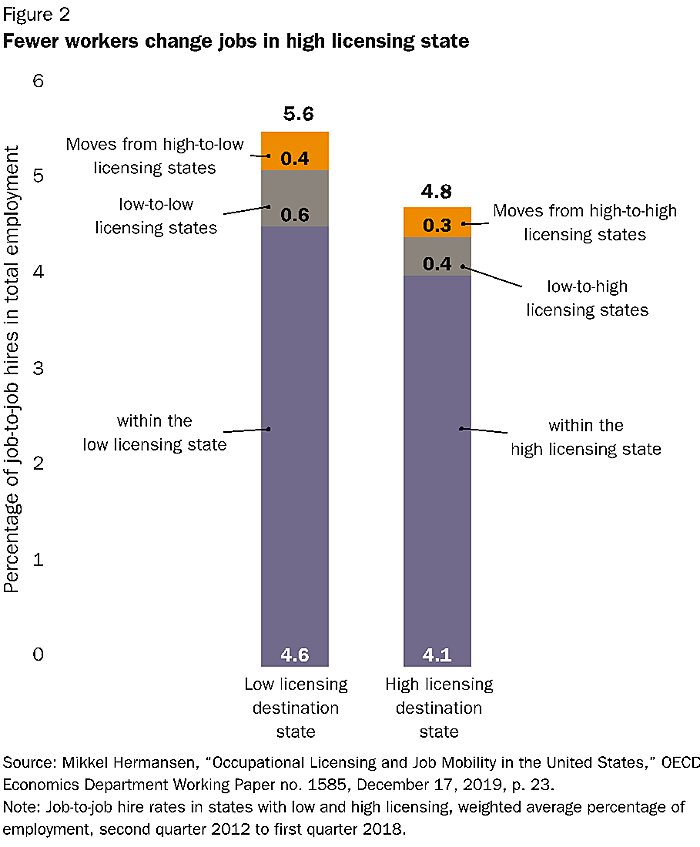
As noted above, recent studies show that job mobility (aka “labor market fluidity”) is linked to higher wages and increased productivity. Interstate licensing restrictions ensure that this beneficial churn is depressed—a particularly heavy burden for certain groups of workers, such as military spouses, who move frequently.
Finally, there are the non-quantifiable harms of routinely criminalizing voluntary economic transactions between consenting adults. As we found out in Florida last week, failure to abide by these restrictions—even when providing legitimate services to a willing consumer—can result in not just a fine or some paperwork, but a felony arrest and conviction (not to mention a very public “perp walk”):
During a State of Emergency, working without proper licensure is a felony. Thanks to #DBPR’s Division of Regulation’s hard work in impacted areas, @CCSOFLSheriff arrested an unlicensed roofing worker putting Floridians at risk. Read more at https://t.co/7nKipJ4l7M. pic.twitter.com/HAHSKwiZZx
— Florida DBPR (@FloridaDBPR) October 9, 2022
Such an outcome is especially perverse, given that a criminal record can not only harm an offender’s future employment prospects but also, as noted above, prevent him from ever getting licensed.
Indeed, the Florida roofer case is a particularly good (bad) example of licensing gone wrong. As R Street’s Shoshana Weissman documented last week, this man was not a criminal. He was a licensed roofer in Texas with a sterling record who was arrested (and humiliated) after he completed a roofing job for a willing (not complaining) Florida homeowner and, quite insanely, just hours after he donated a barbecue dinner to storm-addled Floridians and the local police:
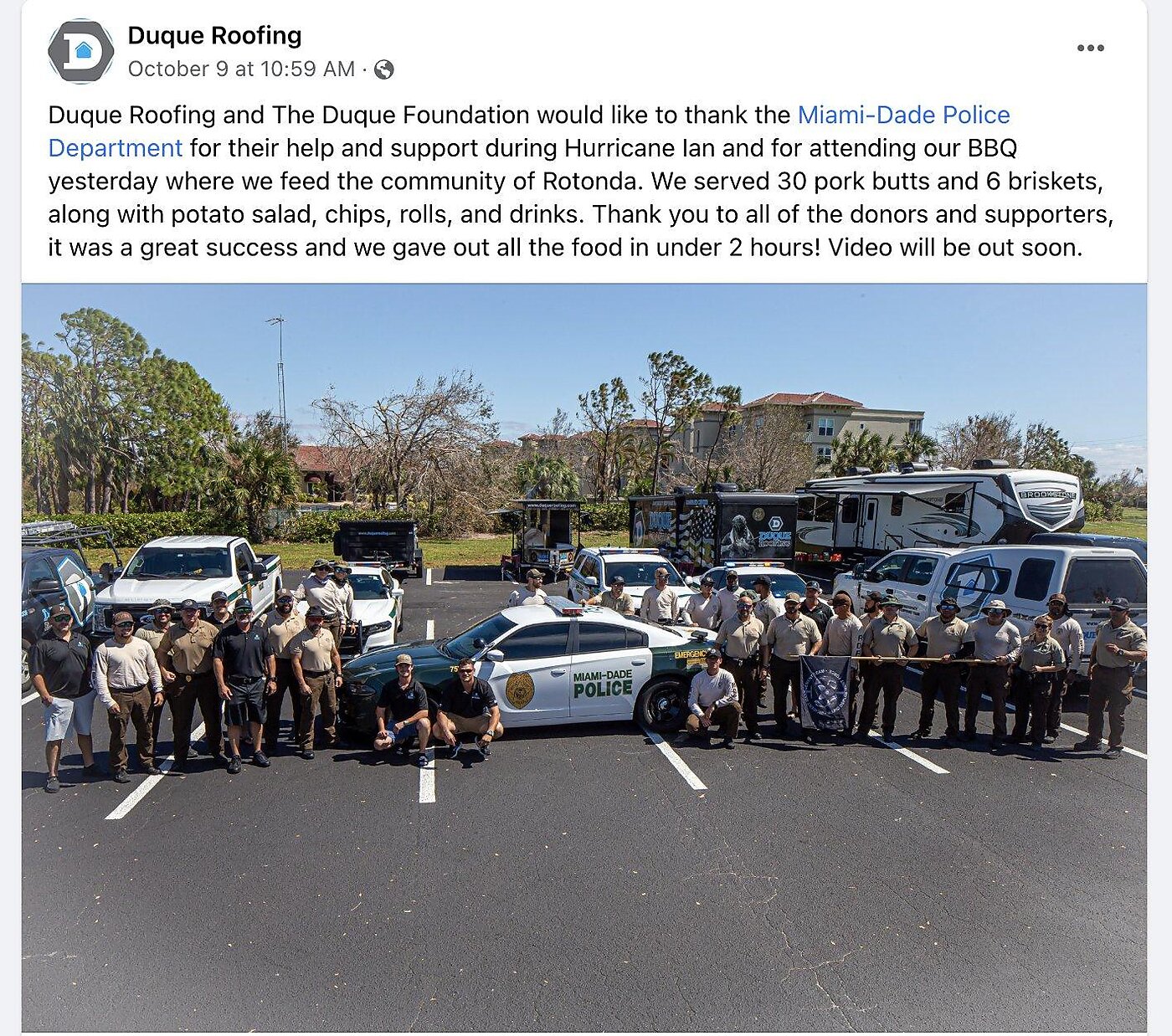
Sure, fraud and bad things can happen after big storms hit, but an arbitrary state gatekeeping system that turns this guy into a felon is in desperate need of reform—for economic and social reasons.
Protecting Incumbents, Not Consumers
Maybe these harms would be justified if occupational licensing actually protected consumers or improved service quality, but this is rarely (if ever?) the case. After reviewing the academic literature in 2015, for example, Kleiner found “little evidence to show that the licensing of many different occupations has improved the quality of services received by consumers.” Also in 2015, the Obama administration found that “most research does not find that licensing improves quality or public health and safety.” Earlier this year, economists Peter Blair and Mischa Fisher reviewed 21 million online transactions in the $500 billion market for home services (i.e., “professional services focused on home renovation and improvement, home maintenance and seasonal upkeep, and home emergency and disaster repair”) and found that licensing a task significantly reduces the number of available suppliers—by almost 37 percent!—without any benefit for consumers. The findings thus confirmed three previous studies showing that “customer self-reports of service quality and objective platform measures of service provider safety do not increase in the presence of licensed service providers,” despite higher prices. OECD economists have come to the same conclusions internationally, as have Kleiner and Maria Koumenta in a brand new book.
As Edwards notes, a key flaw in the “consumer protection” excuse for most occupational licenses is the wide variation among states for most licenses:
That there are large differences in state licensing requirements and covered occupations is a strong indication that many licenses are unnecessary or overly burdensome. Athletic trainers, for example, are not licensed in California, but in Nevada they must have a college degree, pass an exam, and pay $666 for an initial license and $150 for annual renewals. Auctioneers are not licensed in about half the states, but in North Carolina they must have a college degree, pass an exam, and pay $450 for an initial license and $250 for annual renewals. Heating, ventilation, and air conditioning (HVAC) contractors are not licensed in more than a dozen states, but in Nevada they must pass an exam and pay $1,135 for an initial license and $600 for biennial renewals.
Such large differences suggest that rules are not based on analyses of health or safety, but rather reflect differences in politics between the states. Current members of professions often sit on state regulatory boards, and they tend to favor increasing licensing requirements to limit entry and reduce competition. They also often lobby for new restrictions and against reform of current ones.
Going back to our roofer friend, we see that, while Florida and many other states require roofers to hold a specialty license, several others do not: Colorado, Connecticut, Georgia, Idaho, Indiana, Iowa, Kansas, Kentucky, Maine, Maryland, Missouri, Montana, Nebraska, New Hampshire, New Jersey, New York, Ohio, Oklahoma, Pennsylvania, South Carolina, Texas, Vermont, Washington, Wisconsin, and Wyoming. These states might impose general business requirements (registration, insurance, etc.) or have local rules, but their lack of statewide examination, training, and other entry restrictions—“it takes four years to get licensed for a variety of residential and commercial construction work in Florida”—is a strong argument against any “consumer protection” necessity.
In reality, most licensing has little to do with protecting consumers and almost everything to do with protecting incumbents. Indeed, Edwards cites a 2022 IJ study showing that 83 percent of the 494 state “sunrise reviews” (to determine whether to impose new occupational licenses) that the organization examined were initiated by industry groups asking for new licensing restrictions.
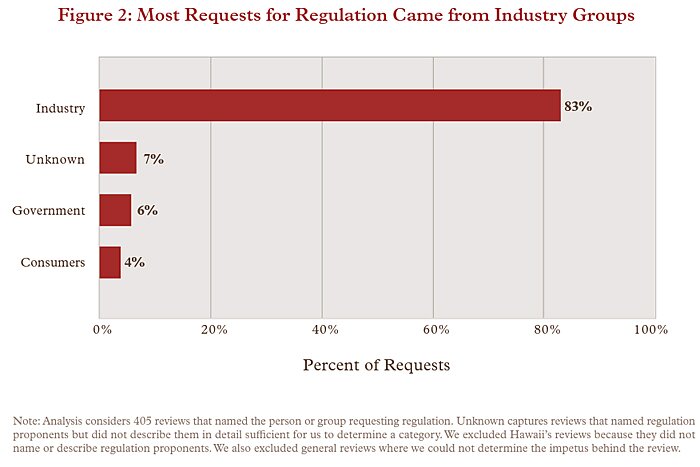
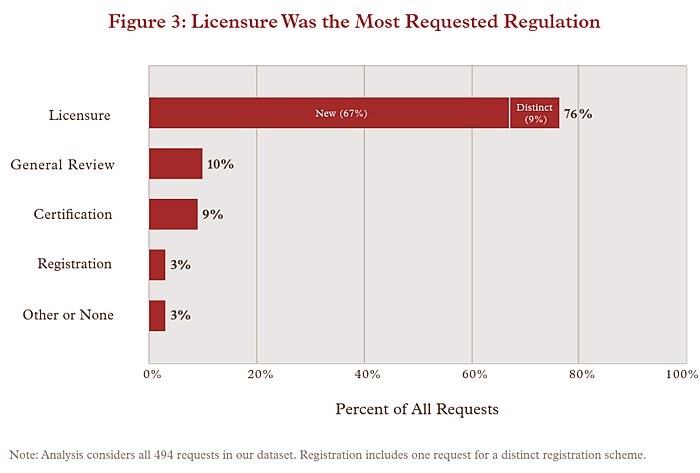
Many examples of new licensing efforts are (predictably) absurd: the “Maine Association of Wetland Scientists sought licensure of soil scientists”; “the Vermont Alarm and Signal Association sought licensure of burglar alarm installers”; and “the United States Lactation Consultant Association has lobbied state governments to mandate licensing and convinced Georgia legislators to do just that in 2016, even though a state sunrise review recommended against it.”
C’mon, man.
A Path to Reform
The state of occupational licensing in America is pretty gloomy, but there’s fortunately some hope for bipartisan reform in the future. Indeed, the last three presidential administrations—Obama in 2015, Trump in 2017, and Biden this year in his Economic Report of the President—have criticized licensing and urged reforms. Wonks on the left, right, and center have also called for liberalizing occupational licensing rules, and several states—red and blue—are pursuing reforms.
For most occupations, the best reform is simply repealing any licensing regulation that hasn’t been adopted by a large majority of other states—a clear sign that licensing isn’t needed. As Edwards notes, Florida did just this in 2020, when it repealed licensing for interior designers, nail technicians, hair braiders, and boxing announcers (no, seriously) because most other states didn’t require such licenses. Contrary to some naysayers, there would remain plenty of voluntary or market-based mechanisms to help consumers, such as online platforms (e.g., Angi), voluntary state registration, and voluntary private certification (which is widely employed in the IT industry). In each case, the mechanism would increase consumer information and encourage providers’ good behavior and skill accumulation, but—because it’s voluntary—wouldn’t impose hard, artificial, and often-arbitrary restrictions on services, work, and economic mobility. Consumers themselves also remain a bulwark against poor quality—we screen stuff every day. Laws policing fraud, theft, gross negligence, and other things supposedly protected by licensing would also remain in force when problems arise. And as already noted, the licenses themselves aren’t actually enhancing quality in most cases, and licensed professionals can (and do) provide bad work too.
For any remaining licenses, states should—
- Hire independent examiners to conduct periodic cost-benefit analyses (“sunset reviews”) of the current requirements, and eliminate licenses that don’t generate net benefits. Per Edwards, Utah recently required that every existing license undergo a sunset review every 10 years.
- Adopt “universal recognition” laws that allow residents licensed in other states to provide services in their new state of residence. First passed by Arizona in 2019, these laws have since been adopted by 17 other states and greatly reduce licensing barriers to worker mobility. A secondary approach would be compacts, under which participating states recognize each other’s licenses for particular occupations. As Edwards notes, “the Nurse Licensure Compact … allows nurses in more than 30 states to practice in other states that are compact members,” and “other multistate compacts exist for physical therapists, psychologists, and emergency medical services personnel.”
- Provide expedited licensing for military spouses, veterans with equivalent military training, education, and experience, and other mobile professionals (or their significant others).
- Reform or repeal regulations, present in about half of states, that allow for a license to be denied because of any criminal conviction, regardless of whether it’s related to the license sought or how long ago it occurred.
- Liberalize “scope-of-practice” rules, which prohibit licensed nurse practitioners or dental hygienists from performing services currently required to be performed by doctors or dentists, respectively.
At the very least, states should stop criminalizing license violations and cut the costs of obtaining and renewing licenses. It’s simply unconscionable that state governments force people to expend massive sums of time and money for the privilege of working in a licensed field, and then throw them in jail if they don’t or can’t pay up.
Summing It All Up
So occupational licensing has expanded dramatically in recent decades, to the detriment of workers, consumers, entrepreneurs, emergency response, and the U.S. economy—basically everything and everyone but the privileged few whom the laws protect from competition (often at their request). They criminalize voluntary transactions and don’t even result in higher quality, healthier, or safer services. Fortunately, many states and multiple administrations have realized these problems and are acting to reform licensing regimes. As recent events surrounding telehealth and Hurricane Ian make clear, however, those actions can’t come soon enough.
Faster, please.
Charts of the Week
